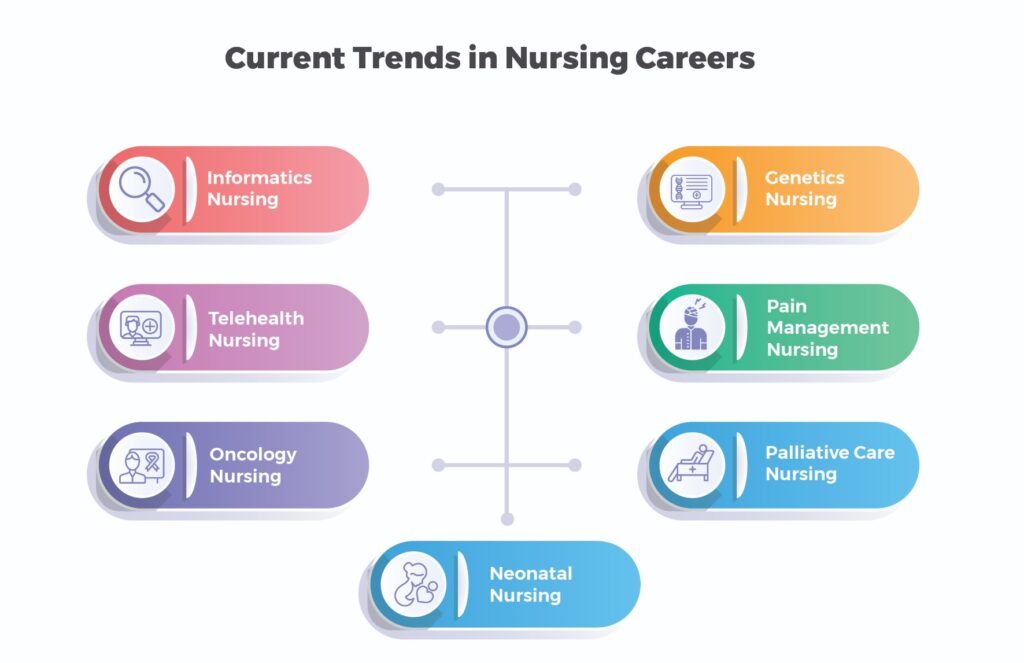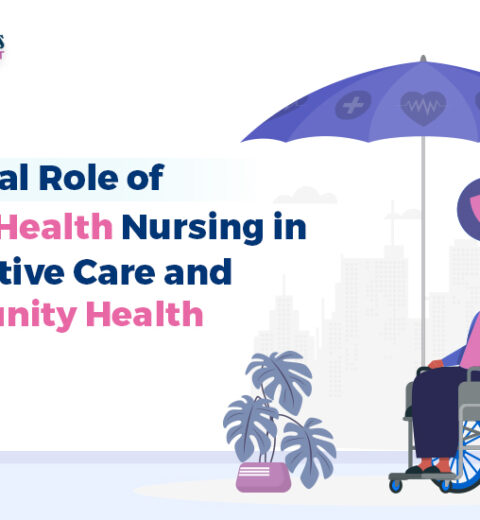Introduction
Did you know that over 20% of registered nurses are now pursuing advanced roles or specializations? As the healthcare field evolves, so do the opportunities within nursing careers. From becoming a nurse practitioner to diving into cutting-edge nurse specializations, the options are vast and exciting. With the right nursing education, you can explore various career pathways and find your niche in this dynamic healthcare job landscape. Let’s dive into the diverse avenues available and how you can shape your nursing career for the future.
1. Nursing Careers – Advanced Practice Roles

Definition and Overview
Let’s talk about advanced practice positions in nursing, where commitment and specific knowledge collide. What makes each role so significant is as follows:
- NPs, or nurse practitioners, are comparable to the Swiss Army knives of the medical field. They take care of everything, including treating patients and providing medications, frequently turning into many patients’ first choice for medical care.
- Clinical nurse specialists (CNSs) are the professionals you should consult when your care needs get complicated. They delve deeply into particular medical fields, enhancing care procedures and supporting patients and other nurses.
- CRNAs, or nurse anesthetists: Consider CRNAs to be the wizards of anesthesia. They guarantee that patients are comfortably sedated during surgery, ensuring a safe and efficient outcome.
- Nurse Midwives (CNMs): CNMs give comprehensive treatment with an emphasis on individualized care during pregnancy and labor. They also offer a warm, personal touch.
Scope of Practice
Below is a brief summary of the responsibilities of each of the nursing careers:
NPs: Possessing advanced degrees and certifications, NPs provide a wide range of medical services, from monitoring ongoing therapies to diagnosing ailments. They have important roles in both specialist and primary care.
CNSs: These experts tackle difficult cases and push for improvements in care by drawing on their extensive knowledge. Their extensive training aids in both patient support and peer education.
CRNAs: Possessing extensive training in anesthesia, CRNAs oversee sedation and pain management, guaranteeing patients’ safety and comfort during procedures.
CNMs: With a background in midwifery, CNMs provide individualized care to expectant mothers and fathers, emphasizing the development of happy, healthy birthing environments.
Read Also : Highest Paying Nursing Jobs
Nursing Careers and its Impact on Patient Care
NPs: They’re improving patient outcomes and satisfaction by increasing access to high-quality treatment, particularly in underprivileged areas. They also add a personal touch.
CNSs: By spearheading practice enhancements and offering superior care, CNSs guarantee patients receive the best care possible and contribute to the advancement of the nursing profession.
CRNAs: Their proficiency with anesthetics improves the security and comfort of surgical treatments, which has a big effect on how quickly patients heal.
CNMs: They support pregnant mothers and help to improve outcomes for both moms and newborns by providing compassionate, patient-centered care.
2. Emerging Specialties
The specialty of nursing careers are changing along with it. A sneak peek at a few of the fascinating new areas is as follows:
Healthcare informatics: This specialty manages and enhances health information systems by fusing IT know-how with nursing knowledge. Data about patients is used efficiently to improve care, thanks to the work of informatics nurses.
Nursing specialising in genetic diseases and their effects on health, genetics nurses offer patients guidance and assistance in managing genetic disorders as well as genetic tests.
Telehealth nursing: Using digital platforms to monitor patients, give consultations, and provide remote care, telehealth nurses are transforming healthcare delivery as technology advances. This makes healthcare more accessible.
Opportunities and Trends

Educational Requirements
Ready to dive into these exciting new roles in the nursing careers? Here’s what you need:
- Informatics Nursing: You’ll need a bachelor’s or master’s in nursing and some extra training in health informatics. Hands-on experience with tech systems helps too.
- Genetics Nursing: A certification in genetics nursing is key, along with advanced coursework or a degree focusing on genetics and counseling.
- Telehealth Nursing: Strong nursing skills are a must, plus some training in telehealth tech and virtual care. Getting certified in telehealth can give you a boost.
These roles are all about blending your nursing skills with new knowledge and technology. So, gear up and get ready to expand your expertise!
3. Career Progression in Nursing
Pathways for Advancement
Thinking about climbing the nursing careers ladder? Here’s how you can move up:
- From Staff Nurse to Management: Many nurses start as staff nurses and then transition into leadership roles, like nurse managers or directors. This involves gaining experience, taking on more responsibilities, and often pursuing additional leadership training.
- Specialized Roles: You might also choose to specialize in areas like critical care, pediatrics, or oncology. This often means additional certifications and focused experience in your chosen field.
- Discuss common career progression routes, including moving from staff nurse to management or specialized roles.
Certifications and Further Education
Ready to give your nursing careers a boost? Here’s how to level up:
- Certifications: Consider adding credentials like Advanced Practice Registered Nurse (APRN), Certified Nurse Practitioner (CNP), or specialty ones such as CCRN for critical care. These can make your resume stand out and open new doors.
- Educational Programs: Think about advancing your education with a Master’s or Doctorate in Nursing. These degrees can lead to higher-level roles and specialized positions, expanding your career opportunities.
Professional Development
Want to stay on top of your game? Here’s how:
- Keep Learning: Dive into workshops, conferences, and seminars. It’s a great way to stay current with nursing trends and updates.
- Network: Engage with fellow professionals through nursing groups and online communities. Networking can provide new insights and opportunities.
- Seek Mentorship: Find a mentor who can offer advice, share their journey, and help you navigate your own career path.
Your nursing career is a journey of growth. Embrace new learning, seek out advanced roles, and keep pushing forward!
Conclusion
There are fantastic growth and specialization options in nursing. Opportunities abound, whether you’re planning your career advancement, targeting advanced practice responsibilities, or investigating new specializations. Reaching your job goals can be greatly aided by having the appropriate training, education, and professional development.
You can get assistance from JP Medicals Recruitment in navigating your nursing career. Our commitment lies in matching you with the most suitable prospects, regardless of your goals – be it career advancement, specialized transition, or finding your next job. Contact us to advance in your nursing career and stay current on the newest trends. This is where you begin your nursing career!






